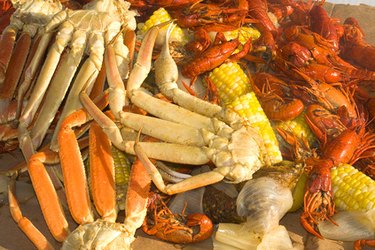
The scent of warm spices, melted butter and succulent crab meat is something beach-goers are familiar with. And though crab is processed in many ways, there are always those leftover legs, ready to be smashed apart and plundered for their hidden treasures. There are thousands of species of crab but only a few have legs large enough, or delicious enough, to grace our tables. The most common of these are found everywhere from old beach crab shacks to Vegas buffets.
The Dungeness
Video of the Day
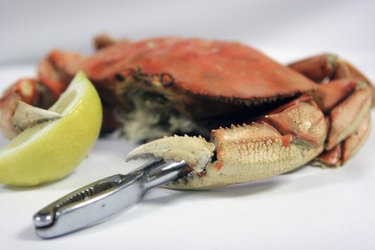
The Dungeness is a common crab fished primarily off the west coast of the United States and Canada. It's a large crab that can measure over 12 inches across and has a high meat-to-shell ratio. The meat packed into the legs of the Dungeness has a sweet flavor and is best enjoyed simply dipped in melted butter. To spice up the common Dungeness, try adding a little cayenne or lemon pepper to your usual crab spice mix.
Video of the Day
The Snow Crab
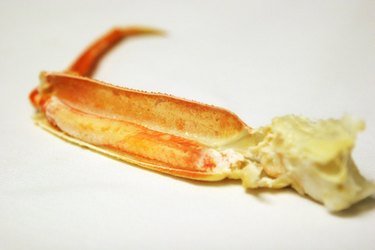
Also known as the Alaskan snow or rock crab, this crustacean's legs boast long strips of thick, sweet meat. Fished along the west coast of Alaska, these crabs are a staple to the seafood industry of the United States. In fact, 58.5 million pounds of snow crab were harvested in the Bering Sea in 2008. This crab's large size and meat accessibility make it a popular restaurant dish. Steam a snow crab to get meat that slides right out of the shell.
The Alaskan King
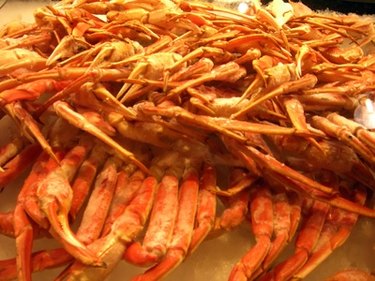
The Alaskan king crab, as its name implies, is a massive specimen. Its legs can reach size 6 to 9 (when it takes six to nine legs to make up ten pounds) and come in three varieties: golden, red, and blue king. Its meat is very soft and sweet and becomes white when cooked. It is the most expensive of the common crab legs, and its harvesting is heavily regulated. Steam or boil Alaskan king and serve it with a butter and garlic sauce to bring out the meat's natural tenderness and sweet flavor.
The Blue Crab
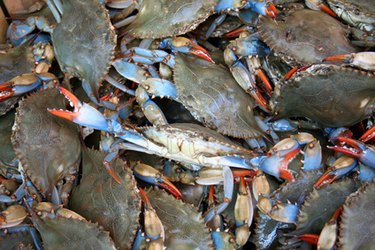
While the west coast may have the Dungeness, the snow crab and the Alaskan king, the east coast boasts its own crab delicacy: the blue crab. This hearty species is the seafood giant of Chesapeake Bay and the surrounding states. Though not as large as the other types, the blue crab has meat with a distinct and unique flavor and a very soft, flaky texture. It is becoming popular worldwide, though because of its small size it is more difficult to crack and eat. Serve blue crab legs with butter and lemon to complement the delicate flavor.
Considerations
When cooking crab legs, it is important to follow cooking instructions thoroughly. Make sure crabs are cooked at the proper times and temperatures and are stored in the proper manner.
Also, breaking open crab legs, while fun, will result in sharp shell fragments or other pieces of the crab. Use tools and fingers with care to fully enjoy your crab-eating experience.